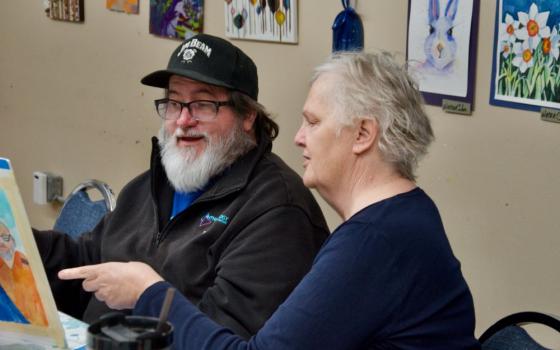
Srs. Marge Clifford and Judy Warmbold add the Daughters of Charity's weekly contributions to the parish compost garden, at Holy Spirit Parish in Maryland Heights, Missouri. In this edition of The Life, panelists discuss their actions to address the climate crisis. (Courtesy of Honora Remes)
In honor of Earth Day on April 22, the columnists responded to the following question:
What is your personal and congregational response to the climate crisis? Have you or your community been involved with action steps around the Laudato Si' platform?
______
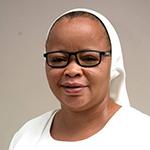
Gifty Atampoka Abane is a member of the Society of the Holy Child Jesus from Ghana. She is a teacher in a Catholic girls' high school in Ghana and serves their province in leadership.
The creation story from the book of Genesis places a huge responsibility on humans as co-creators and caretakers of all creatures. However, beyond our quest for survival, our innate desire for accumulation and our wasteful culture has led humanity to a gross abuse of creation. Laudato Si' challenges our behavior and attitude toward creation and is a call of conscience to "care for our common home," a noble call for introspection on how much we have contributed in the rape of Earth, our mother.
The extreme climate-related disasters throughout the world increase in severity and frequency, loud enough for us to begin earnestly to salvage the future. But world leaders continue to contribute to the destruction of the Earth by their silence and ineffective laws and policies and skewed, hypocritical regulations.
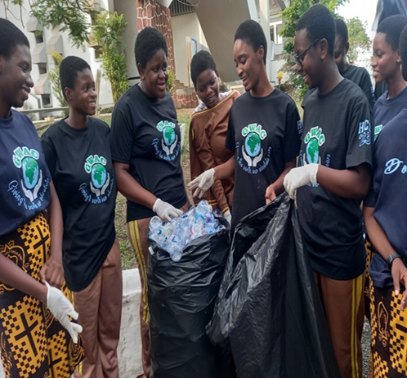
Students from the Holy Child Sisters' school "Global Warming Awareness Club" collect plastic trash in this photo. (Courtesy of Gifty Atampoka Abane)
The Society of the Holy Child Jesus' responses to this call are varied and diversified at the individual, community and province levels. In the African Province, there are activities like advocacy programs for youth in parishes and schools and women's groups on unhealthy practices and their impacts on the environment. Clubs in our schools are integral components in engaging our pupils and students on the care of the environment. Some sisters collaborate with other interest groups in addressing illegal mining, shoreline sand depletion, indiscriminate felling of trees, littering, pollution, bush fires, and waste treatment. Most communities are using solar energy to cut down on their use of electricity from hydropower.
Personally, as a teacher of biology, a subject with an ecological component, at our Holy Child Secondary School, Cape Coast in Ghana, I deliberately incorporate into my lessons the need for healing of the Earth. Perhaps awareness and change in mindset and/or behavior can trigger positive desired attitudes toward the planet. There is no better approach to changing young minds than in the classroom.
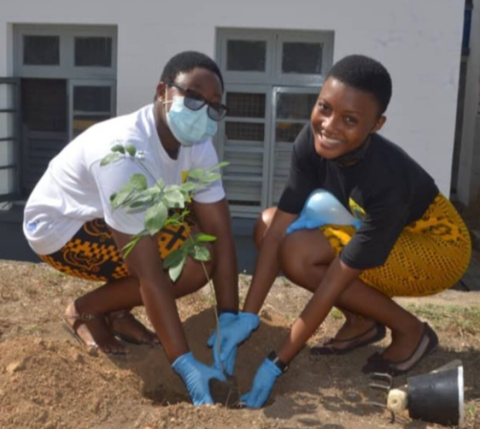
Students from the environmental advocacy club, the "Global Warming Awareness Club," plant a tree in this photo. (Courtesy of Gifty Atampoka Abane)
Teaching biodiversity, facilitating a sense of pervading harmony and balance, challenges them to adopt a systems model of thinking about our wounded Earth. In one lesson on ecology, an environmental advocacy club — "Global Warming Awareness Club" — sprang up. In the club, a series of activities has brought about some positive behavioral change toward the environment.
In 2020, with the support of the African Faith and Justice Network, about 100 students from two Holy Child schools in Cape Coast, Ghana, and in Lagos, Nigeria, participated in a three-day online workshop on care for the Earth. Since then, the club has planted about 1,000 trees in our school environment; members have written poems and articles on the wise and prudent use of the natural resources; and they are working with the archdiocesan Caritas office to recycle plastic wastes.
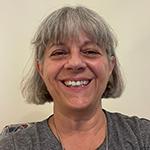
Maco Cassetta is a member of the Congregation of Notre Dame. She is a part-time licensed psychotherapist working with religious life, formation, resiliency, grief, transition, communication skills, sexuality, inner child work, addictions, PTSD, complicated grief, and reconnection to one's soul self, all within an ecoholistic framework. She also does spiritual direction. In her parish, she is the coordinator of the care of creation team and a member of the liturgical team, planning and facilitating prayer evenings. Presently, she is novice director for her community and lives in White Plains, New York.
In spring 2021, the Vatican's Dicastery for Promoting Integral Human Development launched a plan known as the Laudato Si' Action Platform, meant to offer direction that describes a unique collaboration between the Vatican, an international coalition of Catholic organizations, and "all men and women of good will." The plan encourages families, dioceses, schools, congregations, and other institutions to make sustainable development and integral ecology a part of the life of the church and the local community.
For the Congregation of Notre Dame, our orientation direction for the next five years is "to honor, respect and protect our common home, committing ourselves to concrete actions motivated by an integral ecological conscience." Sisters and associates commit in a variety of ways that encourage a participatory integral and educational practice, personally and communally.
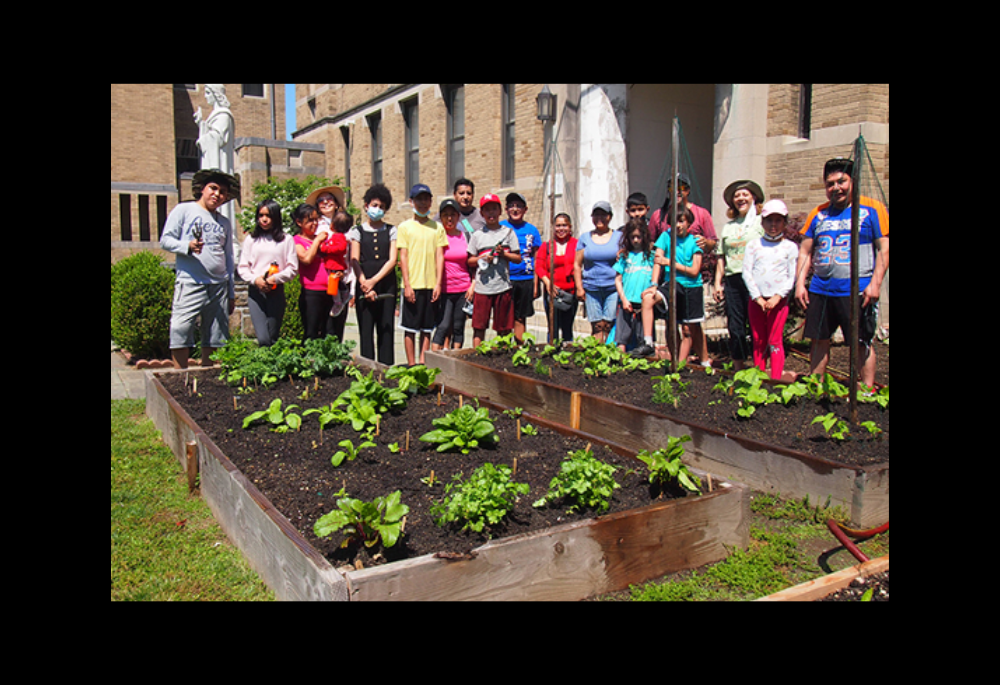
The Care of Creation Ministry of St. John the Evangelist and Our Lady of Mount Carmel Parish in White Plains, New York, works with children and their parents to plant vegetables and herbs in four raised beds on the church's grounds. The produce is then donated to a local food pantry. Sr. Maco Cassetta is third from the right. (Courtesy of Maco Cassetta)
For instance, in Cameroon, Sister Évangeline is committed to help young people work the land in sustainable ways. One of our sisters, Sr. Kathleen Deignan, founder of the Deignan Institute for Earth and Spirit, is committed to fostering an integral and peaceful Earth community in light of "religious faith, evolutionary cosmology, environmental science, and comprehensive justice." In our local community, we compost biodegradable scraps, and we are conscientious of our use of water. We recycle, reuse and reduce.
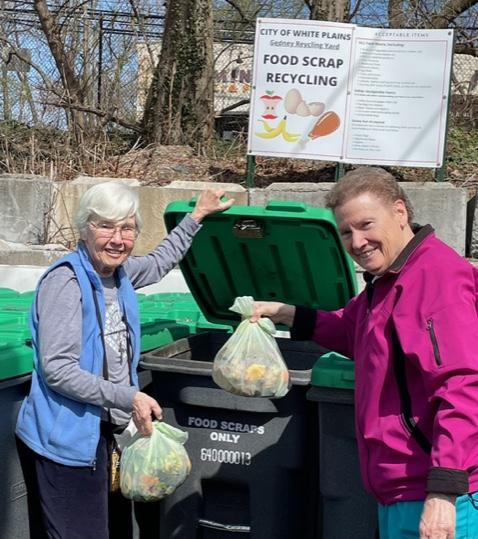
Srs. Cathy Molly and Donna Kelly of the Congregation of Notre Dame, composting at the local food scrap depot in White Plains, New York (Courtesy of Maco Cassetta)
In parts of the world where our sisters serve, collaborative efforts are promoted with organizations that encourage sustainability. In one of New York's parishes, of which I am a part along with the Care of Creation team, we take an integral and concrete approach for the care of our sacred home and environment. The planting and nurturing of a parish garden on the church grounds fosters an integral approach for care of our sacred home while growing food that is donated to the local emergency food pantry.
What gives me hope is the joy of people in their participation as a parish, like a seed is being planted in their hearts. Whether it is the planting and tending of a garden; delivering the harvest to the needy at a local food pantry; hosting talks on how human behavior affects ecological conditions; airing and discussing the movie "The Letter: A Message for our Earth"; engaging in the Stations of the Cross for the Earth; sponsoring community cleanup days and offering herb-kit starters for worshippers to take home, we are raising awareness and encouraging people to have a relationship to the Earth.
These experiences help shift ideologies and promote sustainable choices. While planting a garden on parish grounds, we know its harvest will not make a significant dent in global hunger and climate change, but engaging this "Great Work" with parishioners delivers real benefits personally and in their local communities and has the potential to help heal the planet.

Dorothy Maxwell has been writing reflections on the Sunday readings for the website of the Sisters of St. Dominic of Blauvelt, New York, for years and believes that Dominicans are to preach wherever and whenever possible. She is now in her fourth year of ministry at Bedford Hills Correctional Facility, a maximum-security prison with a population of more than 500.
Finally, a world leader has emerged, and Pope Francis has written Laudato Si', and the citizens of the world are responding. He has called us to examine God's creation, make conclusions, and then take action steps to save the only planet that all living organisms depend on for existence. If implemented, this could be a significant chapter in salvation history.
My journey, from my agrarian roots in a small house with parents and four siblings — who all had chores in the labor requirements of operating a 100-acre farm — to an adult living in the shadow of New York City, reveals how quickly human progress has resulted in the wrath of mother nature.
Small farms have been transformed into agribusiness. Highways that connect manufacturing and warehouses, malls, urban development, suburban homes with lawns and schools with acres of athletic fields now dot the landscapes of every state where once were forests and enough land for tilling soil to provide food that traveled from field to table. Now all of this has resulted in a movement of city gardens and small farms that are the source of healthy food from local farmers markets.
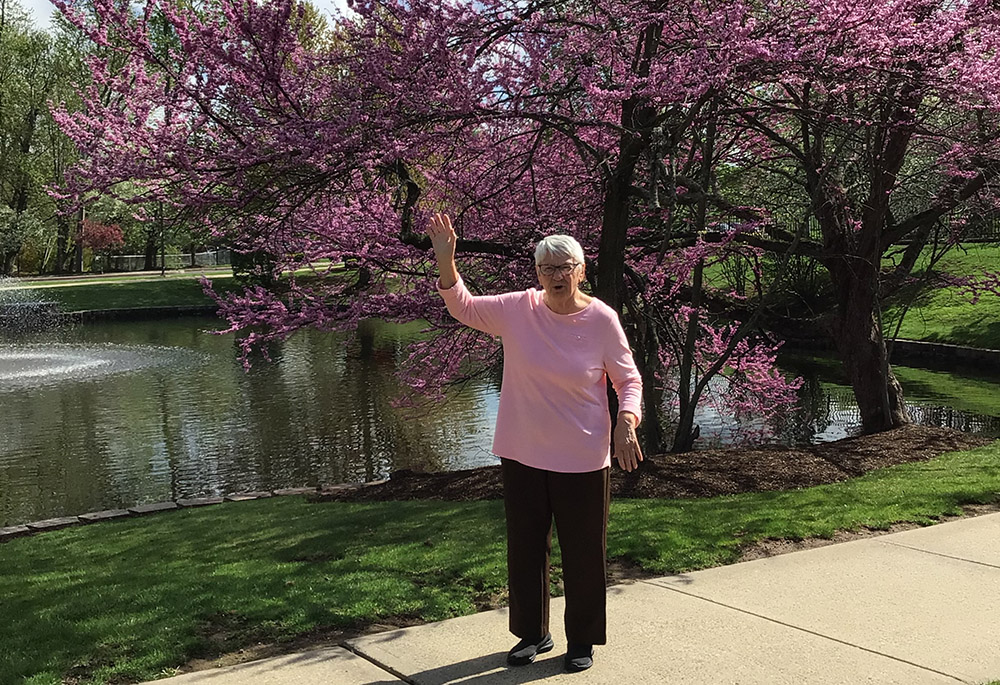
Sr. Dorothy Maxwell, pictured on property belonging to Dominican College in Blauvelt, New York (Courtesy of Dorothy Maxwell)
Fortunately, I have availed myself of the information from knowledgeable resources and partaken in many forums that are action-oriented and challenge me to live daily as I go about work and recreation, mindful of what I use and what I do that affects other organisms and the sustainability of the planet. This is my mindset, and I wish that humans everywhere would adopt it.
The call of Pope Francis is a welcome challenge for my Blauvelt Dominican congregation to continue our work of being responsible stewards. Successive leadership teams have requested that the Social Justice Committee, chaired by Sr. Ceil Lavan, initiate plans of action. Yearly goals are set, and the education of our sisters and associates are implemented along with participation in responding to current and local environmental movements. Networking with several organizations and advocacy groups call us to unite our voice with those who cry aloud for justice.
For 25 years, we have been implementing the words of a land ethic that clearly and concisely spells out that the Earth is the primary sustainer of life. This has been our compass in decision-making as we dispose of properties and maintain and plan for future use of what we now possess. The coming years will contribute to a rich legacy of what we have done and passed on to others as we now are in action for our third year of making Laudato Si' a living document.
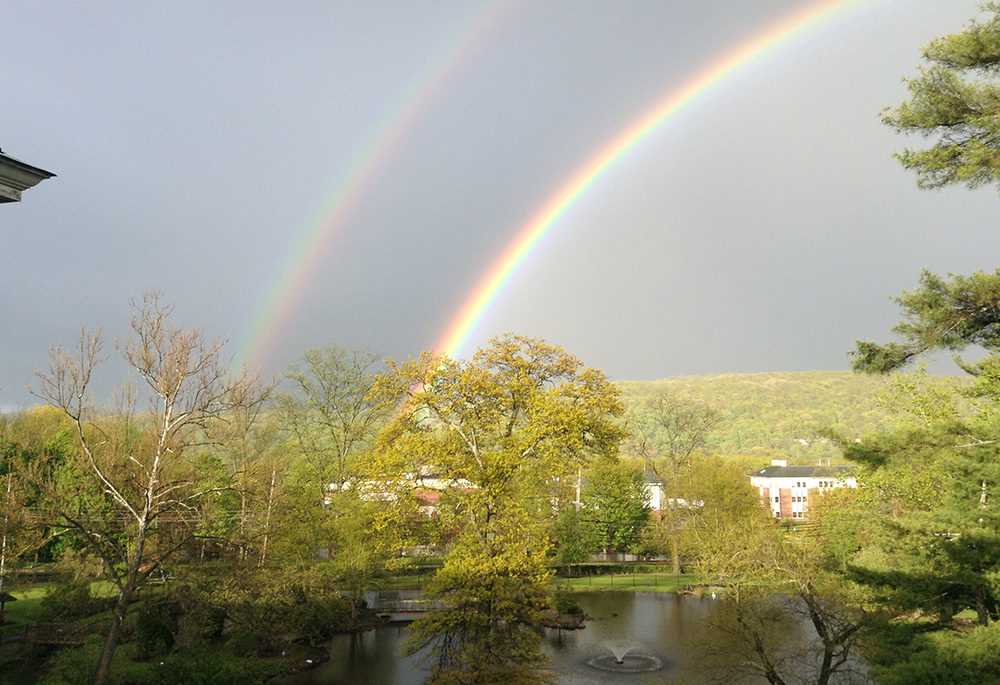
Scenery from the motherhouse campus of the Sisters of St. Dominic of Blauvelt, New York (Courtesy of Dorothy Maxwell)
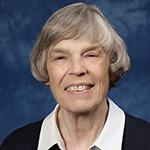
Honora Remes has been a Daughter of Charity of St. Vincent de Paul for 66 years. Born in New Prague, Minnesota, she was first attracted to the Daughters of Charity because of their vow of service to the poor. Her various ministries have included ongoing spiritual direction, annual retreats, vocation ministry, serving as pastor in several Michigan parishes in the Diocese of Saginaw, serving as Daughters of Charity provincial, and offering spiritual awakening classes to homeless women in St. Patrick Center, St. Louis.
Our international and U.S. provincial Daughters of Charity Community clearly commits to protecting the present and future well-being of our planet, especially for those most vulnerable. Watching the evening news, we sorrow for our sisters and brothers battling evident horrors of climate crises. And for me — us, as Daughters of Charity vowed to service of those living in poverty — this becomes an awe-full, challenging mandate. Following the Laudato Si' Action Platform toward sustainable, integral ecology, our sisters are dialoguing, planning, writing, and earnestly reviewing our provincial and down-to-the-wire domestic communal practices.
Advertisement
And yet, in this first-world climate we live in, our responses often come across as too little too late. It feels overwhelming. We stay humbled by how deeply we're influenced by our first-world, U.S. mentality. We pray our small, beginning efforts will somehow help our brothers and sisters suffering most from our wasteful consumer-oriented habits. And we pray for the courage to put aside our entitlement mentality. Here are some ways our D.C. provinces are committing to help protect and heal our planet. And as an international community, this feels personal:
- Our sisters have committed to planting native trees and perennials to provide habitat and food for all.
- In 2021, we modified our investment policy to screen out investments in fossil fuel and companies that violate Environmental Protection Agency and Paris Agreement standards, and we now proactively invest in companies developing sustainable fuel and food sources for those living in worldwide poverty.
- In our communal-house grocery shopping and meal planning, we try to plan and eat more plant-based meals to reduce meat consumption.
- Our website offers ecological education about how nature shows us how abundance, complexity, diversity, space and resilience help our planet flourish.
- We plan for communal meetings with inspiring prayers that reveal the beauty of God's creation.
- We advocate for local community issues protecting our planet, like protection of waterways and access to renewable energy sources, public transportation, and air.
Here's the mantra that might best summarize the truth we're trying to embrace as we try to make the Laudato Si' challenge our own: "Everything is connected!" In the midst of our everyday activities, it's awfully challenging — probably humanly impossible — to remain painfully aware of the larger picture, to turn what's happening to our suffering sisters and brothers into our own personal suffering, and to figure out what each of us personally is called to do about it, individually and together.
But in truth, every one of us is connected in this mission of ecological transformation, even in our small, often personal choices. Jesus said it best: "What you have done to one another, you do to me." So, we keep at it in hope.

Mudita Menona Sodder of Mumbai belongs to the Indian Province of the Religious of the Sacred Heart of Jesus. Presently the JPIC coordinator of the Indian Province for her congregation, for the past 10 years, she has been an active member of the Justice Coalition of Religious, president of Fellowship of Indian Missiologists, and has been engaged in full-time ecospirituality work: retreats, conferences, seminars, and similar activities. Her academic background was in history, sociology, and anthropology, and she did 50 years of teaching and administration as a teacher, social worker, guide, principal, manager and adviser, with much experience in faith-based justice work and religious life.
Integrity of creation, global warming and climate change became a serious concern for religious by 2002. We Religious of the Sacred Heart immediately recognized the broken body of Christ in the broken and suffering Earth. As women of "communion, compassion, contemplation, reconciliation and hope," in our general chapter of 2008, our congregation took up the focus of integral ecology.
Over the past 15 years, our congregation has responded to the climate crisis by reflecting on our constitution through the lens of JPIC (justice, peace, and integrity of creation). Revisiting our experience — of living a life of simplicity in a more integrated way — we called it "Life Unfolding, Offering the Gift." We did a "see, judge, act reflection" on the impacts of mining in 2014. Living in historic times of change and uncertainty, our general chapter in 2016 challenged us to reach new frontiers, live more humanly, create silence, and be and act as one body by loving, practicing and giving witness to JPIC at all levels of our life and mission.
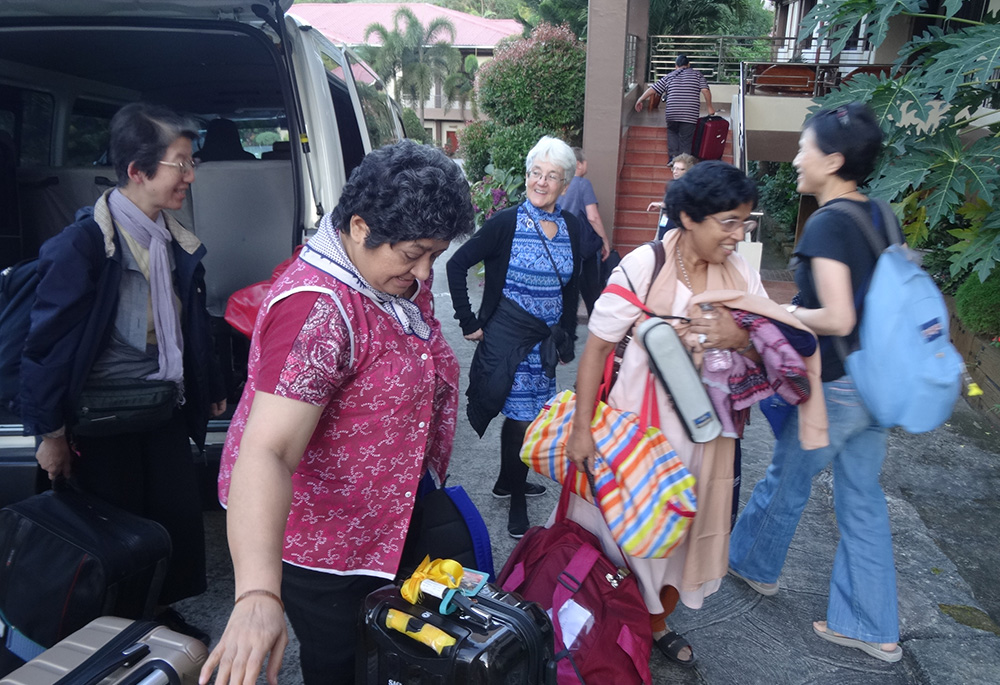
As justice, peace, and integrity of creation (or JPIC) coordinator of the Indian Province since 2012, Sr. Mudita Menona Sodder was part of an international JPIC meeting in 2018 in the Philippines, with 62 participants from 42 countries. She arrives for the meeting in this photo, after having chemotherapy the previous day. (Courtesy of Mudita Menona Sodder)
As JPIC coordinator of the Indian Province since 2012, I was part of an 11-day international JPIC meeting in the Philippines in 2018. Focusing on compassion, relationships, and transformation, we used Otto Scharmer's Theory U of leading from the future as it emerges. The meeting was preceded by three intensive stages where we shared our JPIC stories, self and resources (sensing); explored the broader context of social, scientific, environment, political, cultural and economic spheres (presencing); and synthesizing them in words or symbols (creating) in the context of Pope Francis' encyclicals Laudato Si' and Fratelli Tutti, connecting them with our congregation wisdom and traditions.
These concepts generated a lot of energy and action, and the meeting culminated with a vision statement and a booklet, Being Artisans of Hope in our Blessed and Broken World (2019). We also produced a JPIC International Structure and Strategic Plan (2020-2023) inviting us to start transformative communities of practice through connection, social discernment, ethic of caring, transformative education, and sustainability. Our 2021 special chapter invited us to further connect in a heart way.
Our JPIC office in Rome and United Nations nongovernmental organization in New York publish a quarterly newsletter for global education and advocacy. We assure adequate financial resources for action on behalf of the environment, such as my ecospirituality studies in the United States in 2020. We work with global groups like the Laudato Si' Movement. (I am on the Asia Pacific Eco-Conversion Working Group.)
We celebrate Earth Day every day, breaking ourselves to give birth to a new humanity and a renewed, protected Earth.



